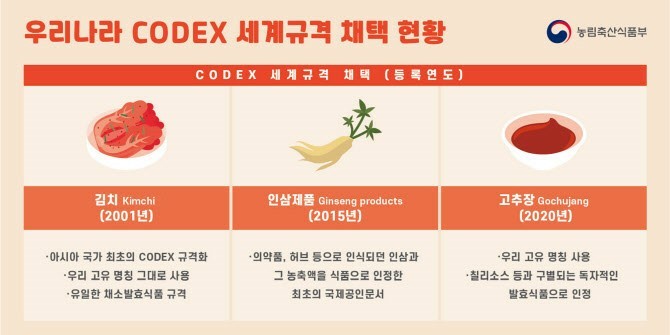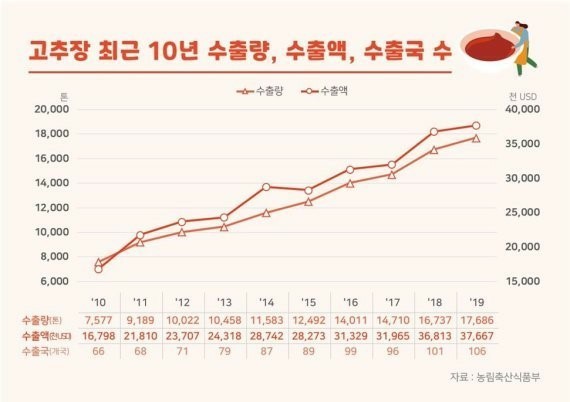On October 13, 2020, the Ministry of Agriculture, Food and Rural Affairs (MAFRA) announced that Gochujang, which has long been a staple in Korean cuisine, was converted from recognition as a regional standard, to worldwide standard, during the 43rd session of the Codex Alimentarius Commission (Codex) on October 12. This meant that ‘Gochujang’ would be the only name used for the traditional Korean condiment and that it would be globally recognized as a unique fermented food, distinguishing it from other sauces made with chilies. South Korea now has three worldwide standards from Codex for Kimchi, Ginseng and Gochujang.
 |
| ▲ Current status of CODEX in Korea. (Photo from the Ministry of Agriculture, Food and Rural Affairs) |
Gochujang was first proposed by MAFRA to Codex for standardization in 2002 and was adopted in 2009 as a regional standard for Asia. However, with no worldwide standard in place, Gochujang was considered the same as red chili paste and red pepper paste. Those unfamiliar with Gochujang did not know the difference between the traditional Korean sauce and other well-known chili sauces. Furthermore, when exporting Gochujang abroad, Korean companies were forced to meet local import certification standards instead of a globally standardized one. With the adoption of a worldwide standard for the product, it is now more convenient for South Korean companies to label and export Gochujang products.
South Korea’s food exports have surged on the back of the popularity of Korean dramas, more popularly known as K-dramas. People around the world are taking an interest in cooking the Korean dishes featured in these shows, leading to an increase in demand for the country’s signature spices and sauces, including Gochujang. K-dramas were a huge hit in Southeast Asian countries including Thailand and Malaysia, contributing to the significant rise in Gochujang exports to this part of the world. According to data from the MAFRA, total exports of Korean agrifoods for the half of this year was tallied at 4.9 billion dollars, a 4.9% increase from the same period last year. During this period, Gochujang led the country’s export boom, with shipments totaling 33.16 million dollars, a 35.6% growth from the same period of last year. The Korean government also expects exports of Gochujang will continue to rise with the stamp of approval from the Codex because once listed by the international body, items are usually subject to lower non-tariff barriers.
 |
| ▲ The graph shows the total amount of Gochujang export in the last 10 years. (Photo from the Ministry of Agriculture, Food and Rural Affairs) |
The domestic food industry welcomed the standardization saying, “The adoption of a Codex World Standard for Gochujang is a great opportunity to let global citizens know of the excellence of Korean food,” adding that it will also be a great help for export activities.
MAFRA organized various events commemorating the adoption of Gochujang as a world standard by Codex. As of October 14, they began selling 67 different varieties of Gochujang that received the traditional food quality certification from the Korean Traditional Food Association at a 10-20% discount. Gochujang manufacturers including CJ CheilJedang and Daesang are planning to hold promotional events at hypermarkets to further promote Gochujang’s adoption as a global standard. Park Byung Hong, chief food industry policy officer at the MARFA said, “We will continue to seek out international standards for competitive Korean food like kimchi, ginseng and gochujang,” and added, “We will also work hard to globalize and strengthen the competitiveness of our agri-food by investing in businesses related to the development of the traditional Korean fermented dish, the promotion of Korean food, vitalization of culinary tourism, diversification of export markets, etc.”
Codex is an international body made up of 189 countries, which decides on international food guidelines, global food standards and policies. Earning their stamp of approval as a unique product is likely to boost sales of the goods overseas. This coupled with the phenomenon of the Korean cultural wave stimulating demand for Korean products, is expected to have a positive influence on the K-food export market. It is being considered a major turning point in the global distribution of Gochujang and will likely lead to a lowering of non-tariff barriers that will further stimulate demand. As with Kimchi's adoption in 2001 and Ginseng's adoption in 2015, the adoption of Gochujang as a world standard is expected to once again, promote the idea of Korean food superiority, to the world.
권유지, 박유정, 김서연 dankookherald@gmail.com

![[Campus Magnifier] Let's Surf the Library!](/news/photo/202404/12496_1765_4143.jpg) [Campus Magnifier] Let's Surf the Library!
[Campus Magnifier] Let's Surf the Library!
![[Campus Magnifier] Let's Surf the Library!](/news/thumbnail/202404/12496_1765_4143_v150.jpg)





